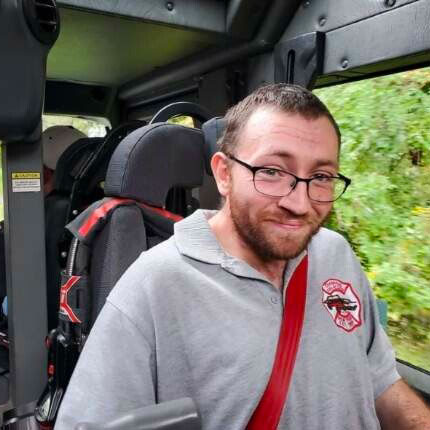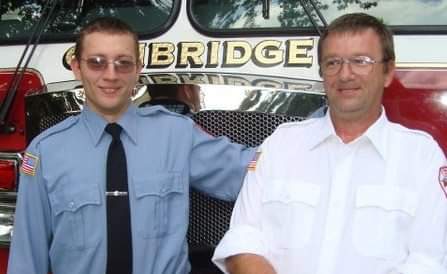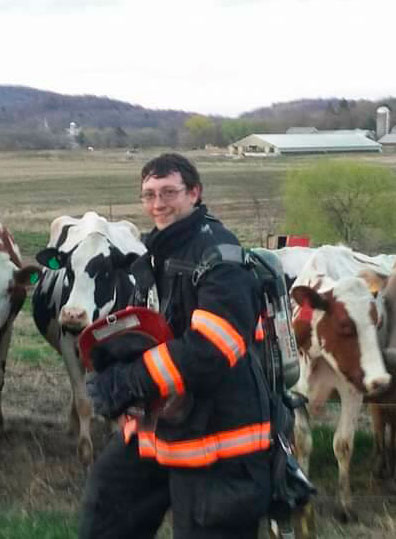Patient Stories
Meet Travis
35 , lives with Wilson’s disease
James – Cambridge NY – 64

"All of a sudden I couldn’t do anything for myself," says Travis, now 35. "I thought I was going to die."
Travis is young man with a multitude of accomplishments. He is a trained chef, holds a college degree, is a volunteer firefighter and earned a black belt in karate.
Most of all, he takes pride in raising his 9-year-old daughter as a single father. Three years ago, at age 32, a sudden and severe health crisis forever changed his life. Debilitating tremors, pain, and cognitive issues left him unable to speak, walk, or care for himself or his daughter. Confined to bed in unbearable pain, his parents provided round-the-clock care. “All of a sudden I couldn’t do anything for myself,” says Travis, now 35. “I thought I was going to die.”
Travis’ father, James, noticed something was wrong when his usually quiet and respectful son began experiencing mood swings over the course of many months. “Little things would set him off,” says James. “He was always so kind and mild-mannered, and he would erupt in rage.” Travis also developed tremors, drooling, and restlessness. Despite hospital visits and anti-anxiety medications, his symptoms worsened, causing intense pain and self-inflicted injuries. “The unknown is the scariest part,” Travis recalls. “Will I make it? And not being able to talk meant that I couldn’t ask if I would be okay.”

Tests for Parkinson’s and seizure disorders were inconclusive, and he was falsely accused of drug abuse. Everyday tasks became challenging, and he was twice pulled over for erratic driving, with police suspecting substance abuse. “It was embarrassing,” Travis says. “People knew me as a firefighter, and now they thought I was drinking and driving.”
Travis’ pain became unbearable, and he could no longer walk unaided. “I knew he needed real help,” says James. James and Travis visited the emergency room multiple times. At one visit, he was admitted for one week. During this time, an astute doctor suspected Wilson’s disease after noticing unusual rings around Travis’ eyes. Wilson’s disease, a rare inherited condition, causes dangerous copper buildup in organs. Wilson’s disease can cause devastating neurological and physical symptoms and without treatment can be fatal. “The medical team tried their best but were unsure since they’d never treated Wilson’s disease before,” says Travis. “It was unsettling to see them looking up information about Wilson’s disease on their phones.” After consulting with medical experts from around the country, Yale University, a Center of Excellence for Wilson’s disease advised to initiate treatment for Wilson’s disease to remove copper form Travis’s system.
Travis was eventually transferred to a larger hospital and admitted for two weeks for additional tests to confirm Wilson’s disease diagnosis and to begin aggressive treatment even without a definitive diagnosis. There were delays in transferring Travis’ paperwork, and for a while the hospital had no medical records to review. “I overheard the medical team whispering that they didn’t think I was going to make it,” Travis recalls. “They didn’t think I could hear, but I could. It was a turning point. I’m a single dad with a lot to live for, and I wasn’t going to die.”
Travis was able to connect through video with a team at Yale University, but the team there still wanted to evaluate him in person. Two weeks later, Travis and James travelled to Yale to meet with experts in Wilson’s disease. By now, Travis has deteriorated and was in a wheelchair. One of the Yale medical team told Travis, “It’s going to get worse before it gets better.” The team at Yale continued the withdrawal of copper, but at a slower rate than before.
Though medical staff recommended a full-time care facility, his parents insisted on taking him home. “Wilson’s disease has become a burden on all of us,” James recalls. “I retired at 60 and six months later became a full-time caregiver to my son.” Travis needed 24-hour care, with hourly medications. He couldn’t eat, walk, or talk for months. Slowly, he is emerging from the “fog” – and much of those many months he doesn’t remember.

Three years later, Travis is still working on his recovery and adjusting to life with Wilson’s disease including a restrictive diet and many medications. He no longer uses a wheelchair and has become more self-sufficient.
Travis still can’t work or drive. He has difficulty regulating his emotions and has short term memory loss.
He begins his day at 4:30 a.m. to take his first of several doses of medication. There are only certain times he can eat due to interactions between his medication and food.
I try to be better with people," says Travis, "but it’s hard."
He can again care for his daughter, who motivates him to keep making progress. Before Wilson’s disease, Travis earned a black belt in karate and was an accomplished artist. “I got sick and lost everything,” he says. “I was in a dark place. Everything was taken away – food, job, activities. Now, I don’t hope to fight fires again or have a normal life. I can’t handle more disappointment.”
As a volunteer firefighter, Travis is programmed to help people. By sharing his story, he hopes to raise awareness of Wilson’s disease and provide help and hope to others. “If you think you have it, get tested. I’m sharing my story and the symptoms I had, so I am doing my part to raise awareness. It is also so important to find the right doctor.”
For dad James, who is a retired firefighter, there are silver linings to his family’s ordeal. “When my son was in crisis, I saw the best of people in my community,” says James. “Without a community supporting us – our church, the fire department, medical teams at various hospitals and strangers in our town, I don’t think we would have gotten through this. I am grateful for the donations, the meals, the simple acts of kindness that got us through our hardest days.”
Travis is adjusting to life with Wilson’s disease and is hopeful that research and more awareness will lead to better treatment options. For now, he is grateful for the patient community for understanding better than anyone what life has been like since his diagnosis. “Someone else with Wilson’s disease said something that I often reflect on,” Travis says, “He told me it feels like you’re in a club. You didn’t want to be in it, but you’re not alone.”
Someone else with Wilson’s disease said something that I often reflect on,” Travis says, “He told me it feels like you’re in a club. You didn’t want to be in it, but you’re not alone.”

